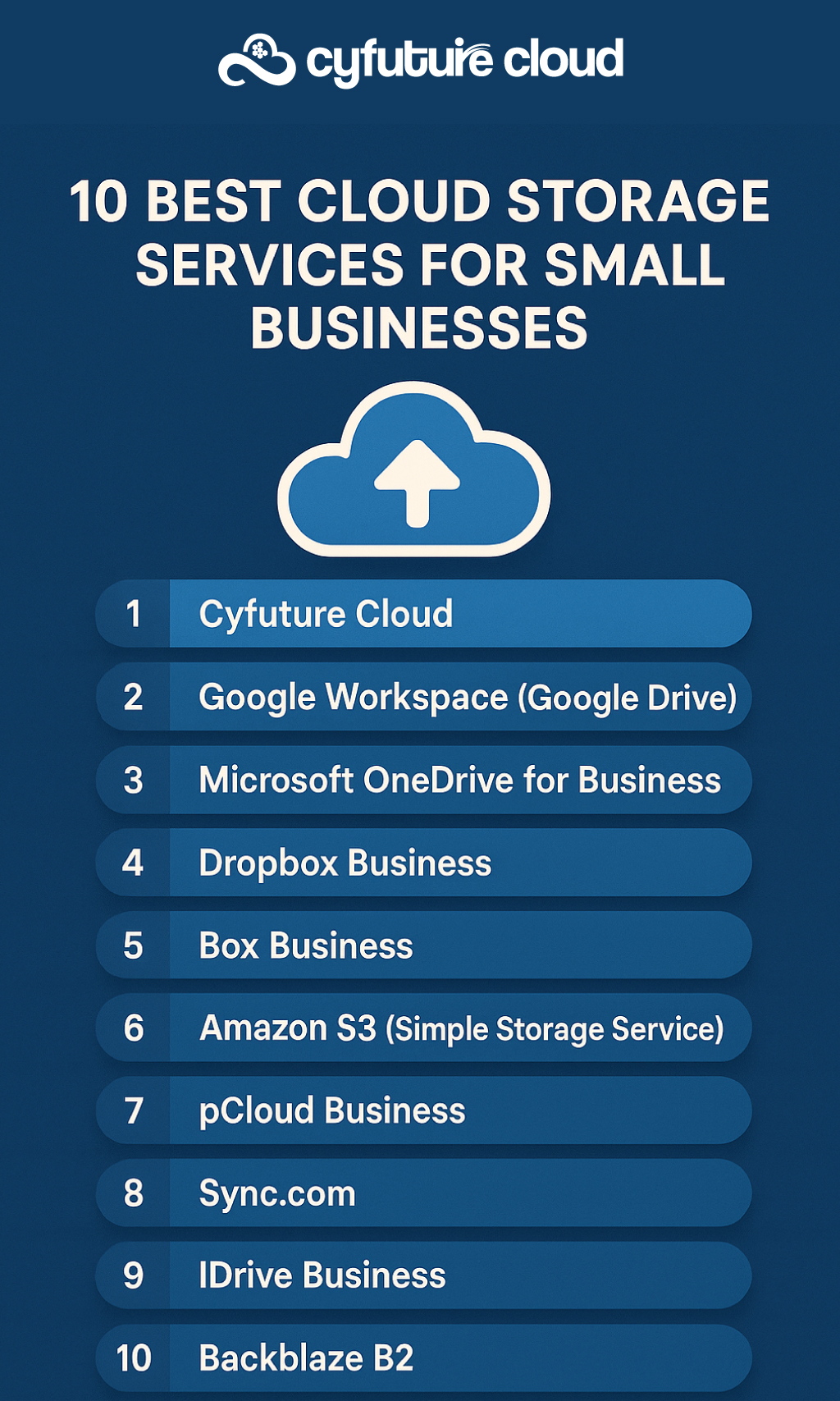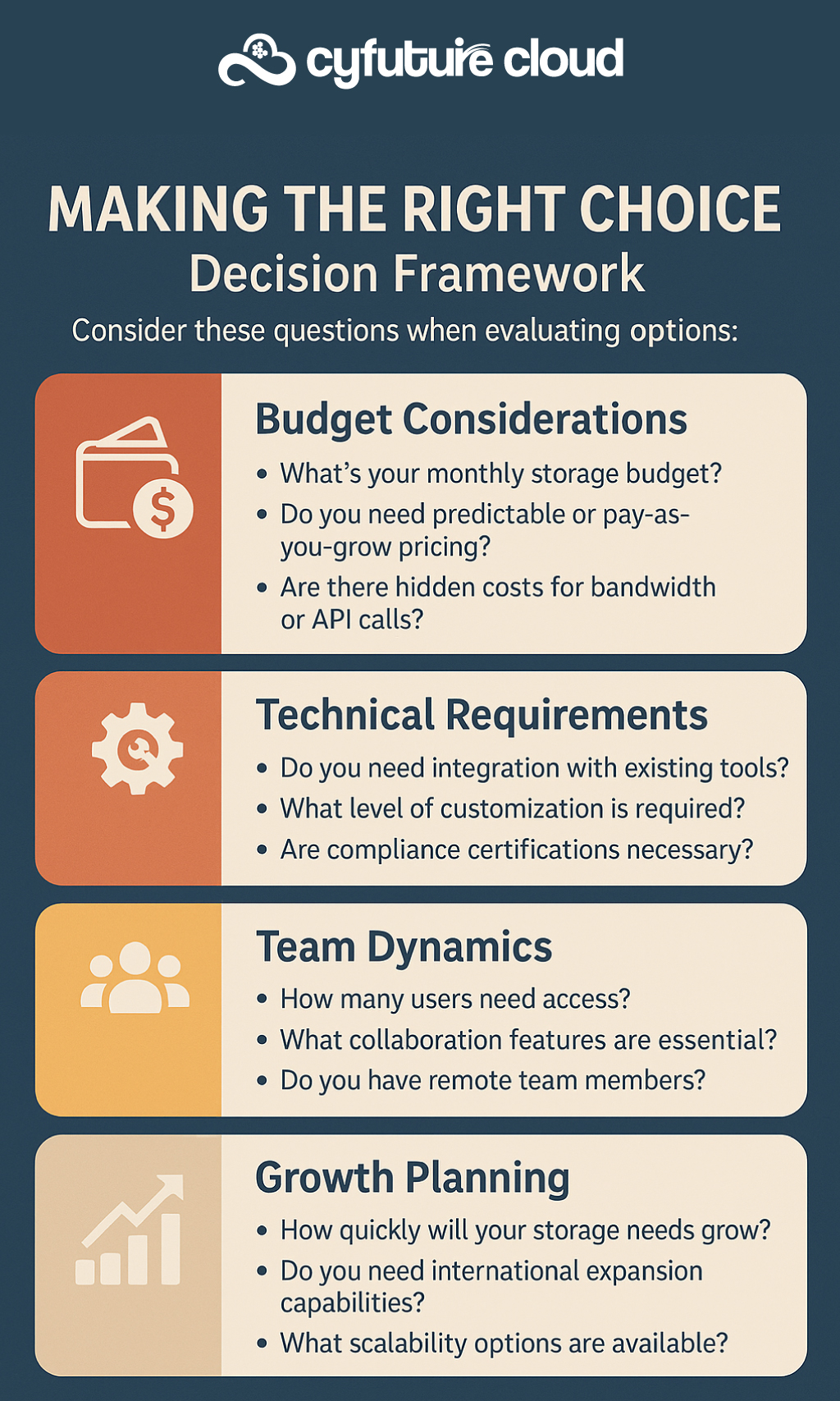Table of Contents
- Introduction: Revolutionizing Small Business Data Management
- The 10 Best Cloud Storage Services for Small Businesses in 2025
- Comprehensive Comparison Table
- Detailed Feature Comparison Matrix
- Key Statistics Driving Cloud Storage Adoption
- What Makes Cyfuture Cloud Stand Out?
- Expert Selection Criteria: How We Evaluated These Services
- Cloud Storage Trends Shaping 2025
- Common Implementation Pitfalls to Avoid
- Future-Proofing Your Cloud Storage Strategy
- Frequently Asked Questions
- How much cloud storage does a small business typically need?
- Is cloud storage secure enough for sensitive business data?
- Can I switch between cloud storage providers easily?
- What happens if my cloud storage provider goes out of business?
- How do I calculate the true cost of cloud storage?
- Do I need different providers for backup vs. active storage?
- What compliance certifications should I look for?
- How can I optimize cloud storage costs?
- What bandwidth do I need for cloud storage?
- Transform Your Business Operations with Smart Cloud Storage
Introduction: Revolutionizing Small Business Data Management
Were you searching for reliable cloud storage solutions that can transform your small business operations? The cloud storage landscape in 2025 offers unprecedented opportunities for small businesses to scale, secure, and streamline their data management while reducing operational costs by up to 40%.
Cloud storage for small businesses has evolved from a luxury to an absolute necessity, with the global cloud storage market projected to reach $639.40 billion by 2032, growing at a remarkable 21.7% CAGR. This explosive growth reflects how businesses are rapidly adopting cloud-first strategies to remain competitive and agile in today’s digital economy.
Here’s the reality:
- The global cloud storage market is projected to grow from $161.28 billion in 2025 to $639.40 billion by 2032, at a CAGR of 21.7% during the forecast period
- The global cloud computing market hit $912.77 billion in 2025, up from $156.4 billion in 2020
- Small businesses using cloud storage report 23% faster file access and 35% improved collaboration efficiency

What Is Cloud Storage for Small Businesses?
Cloud storage is a service model where data is maintained, managed, and backed up remotely on internet-connected servers, allowing businesses to access their files from anywhere with an internet connection. For small businesses, it eliminates the need for expensive on-premises infrastructure while providing enterprise-grade security and scalability.
The core benefits include:
- Cost Efficiency: Reduce IT infrastructure costs by 30-50%
- Scalability: Pay only for storage you use
- Accessibility: Access files from any device, anywhere
- Security: Enterprise-grade encryption and compliance
- Collaboration: Real-time file sharing and editing
The 10 Best Cloud Storage Services for Small Businesses in 2025

1. Cyfuture Cloud
Why Cyfuture Cloud Leads the Pack
Cyfuture Cloud emerges as the top choice for small businesses seeking robust, scalable cloud storage solutions tailored specifically for the Indian market and growing international presence. With its competitive pricing and comprehensive feature set, Cyfuture Cloud has gained significant traction among SMEs.
Key Features:
- 99.9% uptime guarantee with SLA backing
- Advanced encryption (AES-256) for data at rest and in transit
- Multi-cloud integration capabilities
- 24/7 technical support with dedicated account managers
- Compliance with ISO 27001, SOC 2, and GDPR standards
- Hybrid cloud deployment options
Pricing Structure:
- Starter Plan: ₹2,500/month (500GB storage, 10 users)
- Business Plan: ₹7,500/month (2TB storage, 50 users)
- Enterprise Plan: ₹25,000/month (10TB storage, unlimited users)
- Custom Plans: Available for specific requirements
Perfect For: Small to medium businesses requiring localized support, regulatory compliance, and cost-effective scaling.
2. Google Workspace (Google Drive)
The integration powerhouse continues to dominate the small business cloud storage market with its seamless ecosystem integration.
Key Features:
- Native integration with Google Workspace suite
- Real-time collaboration tools
- Advanced sharing controls
- AI-powered search functionality
- Version history and file recovery
Pricing:
- Business Starter: $6/user/month (30GB storage)
- Business Standard: $12/user/month (2TB storage per user)
- Business Plus: $18/user/month (5TB storage per user)
3. Microsoft OneDrive for Business
Microsoft’s cloud storage solution offers exceptional integration with Microsoft 365 ecosystem, making it ideal for businesses already using Windows and Office applications.
Key Features:
- Seamless Office 365 integration
- Advanced threat protection
- Data loss prevention
- Mobile device management
- SharePoint integration
Pricing:
- OneDrive for Business Plan 1: $5/user/month (1TB storage)
- OneDrive for Business Plan 2: $10/user/month (unlimited storage)
4. Dropbox Business
A pioneer in cloud storage, Dropbox continues to excel in user experience and collaboration features.
Key Features:
- Smart Sync technology
- Advanced admin controls
- Paper integration for documentation
- HelloSign integration
- Extensive third-party integrations
Pricing:
- Professional: $16.58/user/month (3TB storage)
- Standard: $15/user/month (5TB team storage)
- Advanced: $24/user/month (unlimited storage)
5. Box Business
Enterprise-focused cloud storage with robust security and compliance features.
Key Features:
- Advanced security and governance
- Workflow automation
- Content management
- API-first platform
- Industry-specific solutions
Pricing:
- Business: $15/user/month (unlimited storage)
- Business Plus: $25/user/month (unlimited storage + advanced features)
- Enterprise: $35/user/month (unlimited storage + premium features)
6. Amazon S3 (Simple Storage Service)
Amazon S3 is a highly customizable cloud storage service for businesses that require scalability, flexibility, and strong security. It supports pay-as-you-go pricing, so you only pay for what you use.
Key Features:
- 99.999999999% (11 9’s) durability
- Pay-as-you-use pricing model
- Global edge locations
- Advanced analytics
- Machine learning integration
Pricing:
- Standard: $0.023/GB per month
- Infrequent Access: $0.0125/GB per month
- Glacier: $0.004/GB per month (archival)
7. pCloud Business
European-based cloud storage provider offering lifetime plans and strong privacy features.
Key Features:
- Lifetime storage plans
- Client-side encryption
- Media streaming capabilities
- File versioning
- European data centers
Pricing:
- Business: $7.99/user/month (1TB per user)
- Business Pro: $15.98/user/month (2TB per user)
8. Sync.com
Canadian cloud storage provider focusing on privacy and security with zero-knowledge encryption.
Key Features:
- Zero-knowledge encryption
- Secure file sharing
- Remote device wipe
- Compliance certifications
- White-label solutions
Pricing:
- Teams: $5/user/month (1TB per user)
- Business: $15/user/month (unlimited storage)
9. IDrive Business
Comprehensive cloud backup and storage solution with competitive pricing for large storage requirements.
Key Features:
- IDrive is an affordably-priced and easy to use cloud storage service with a storage capacity of up to 10TB. We found it reliable and secure, with support for unlimited devices and end-to-end encryption.
- Unlimited devices support
- Historical versioning
- Mobile apps
- Snapshot backups
Pricing:
- IDrive Business: $74.62/year (250GB for 5 computers)
- IDrive Team: $149.62/year (500GB for 25 computers)
10. Backblaze B2
Developer-friendly cloud storage with transparent pricing and simple API.
Key Features:
- S3-compatible API
- Hot cloud storage
- No minimum storage requirements
- Free egress to Cloudflare
- Simple pricing structure
Pricing:
- Storage: $0.005/GB per month
- Downloads: $0.01/GB
- API Calls: Free up to 10,000/day
Comprehensive Comparison Table
|
Provider |
Starting Price |
Storage Limit |
Key Strength |
Security Level |
Best For |
|
Cyfuture Cloud |
₹2,500/month |
500GB-10TB+ |
Local support, compliance |
AES-256, ISO 27001 |
Indian SMEs |
|
Google Drive |
$6/user/month |
30GB-5TB |
Integration ecosystem |
Enterprise-grade |
Google users |
|
OneDrive |
$5/user/month |
1TB-Unlimited |
Microsoft integration |
Advanced threat protection |
Microsoft shops |
|
Dropbox |
$15/user/month |
3TB-Unlimited |
User experience |
AES-256 |
Creative teams |
|
Box |
$15/user/month |
Unlimited |
Enterprise features |
Advanced governance |
Regulated industries |
|
Amazon S3 |
$0.023/GB |
Unlimited |
Scalability |
11 9’s durability |
Developers |
|
pCloud |
$7.99/user/month |
1TB-2TB |
Lifetime plans |
Client-side encryption |
European businesses |
|
Sync.com |
$5/user/month |
1TB-Unlimited |
Privacy focus |
Zero-knowledge |
Privacy-conscious |
|
IDrive |
$74.62/year |
250GB-10TB |
Value pricing |
End-to-end encryption |
Budget-conscious |
|
Backblaze B2 |
$0.005/GB |
Unlimited |
Developer-friendly |
Standard encryption |
Tech companies |
Detailed Feature Comparison Matrix
Storage & Scalability Features
|
Feature |
Cyfuture |
|
OneDrive |
Dropbox |
Box |
Amazon S3 |
|
File Size Limit |
100GB |
750GB |
100GB |
No limit |
32GB |
5TB |
|
Versioning |
✓ |
✓ |
✓ |
✓ |
✓ |
✓ |
|
Auto-scaling |
✓ |
✓ |
✓ |
✓ |
✓ |
✓ |
|
API Access |
✓ |
✓ |
✓ |
✓ |
✓ |
✓ |
|
Bandwidth Limit |
Unlimited |
Unlimited |
Unlimited |
Unlimited |
Unlimited |
Pay-per-use |
Key Statistics Driving Cloud Storage Adoption
The numbers tell a compelling story:
- Market Growth: The global cloud storage market was valued at USD 58.91 billion in 2024 and is expected to grow to USD 70.75 billion in 2025, reaching USD 254.84 billion by 2033, with a projected CAGR of 20.1% from 2025 to 2033
- Data Volume: It is estimated that the world’s data volume is expected to grow over 170 zettabytes by 2025, which will necessitate scalable storage solutions that conventional on-premises systems cannot provide
- Cost Savings: Small businesses report average cost savings of 35-50% when switching from on-premises to cloud storage
- Productivity Gains: Teams using cloud storage show 40% improvement in collaboration efficiency
- Remote Work: 78% of small businesses cite cloud storage as essential for remote work capabilities
What Makes Cyfuture Cloud Stand Out?
Two significant advantages position Cyfuture Cloud at the forefront:
- Localized Excellence: With data centers strategically located across India, Cyfuture Cloud offers superior latency and compliance with local data protection regulations, giving Indian businesses a competitive edge.
- Cost Leadership: Cyfuture Cloud’s pricing structure delivers up to 40% cost savings compared to international providers while maintaining enterprise-grade security and reliability standards.
“Cyfuture Cloud has transformed our data management capabilities. The local support and competitive pricing made it an obvious choice for our growing team.” – Tech Startup Founder, Bangalore
Expert Selection Criteria: How We Evaluated These Services
Our evaluation methodology considered eight critical factors:
1. Pricing Transparency We analyzed total cost of ownership, including hidden fees and scaling costs.
2. Security Standards Evaluation of encryption methods, compliance certifications, and access controls.
3. Performance Metrics Upload/download speeds, uptime guarantees, and global accessibility.
4. Integration Capabilities Native integrations with business tools and API availability.
5. User Experience Interface design, mobile apps, and learning curve assessment.
6. Customer Support Response times, support channels, and expertise levels.
7. Scalability Options Growth accommodation and plan flexibility.
8. Compliance Features Industry-specific compliance and data governance tools.
Cloud Storage Trends Shaping 2025
The landscape continues evolving with several key trends:
AI-Powered Management Machine learning algorithms now optimize storage allocation and predict capacity needs, reducing costs by up to 25%.
Edge Computing Integration Hybrid storage solutions combining cloud and edge computing deliver faster access for distributed teams.
Zero-Trust Security Models Enhanced security frameworks ensure data protection regardless of access location.
Multi-Cloud Strategies Businesses increasingly adopt multi-cloud approaches to avoid vendor lock-in and optimize costs.
“Cloud storage isn’t just about storage anymore – it’s about creating intelligent data ecosystems that drive business growth.” – Cloud Architecture Expert

Industry-Specific Recommendations
Healthcare & Life Sciences: Box or Cyfuture Cloud for HIPAA compliance and advanced governance features.
Financial Services: Cyfuture Cloud or Microsoft OneDrive for regulatory compliance and integration capabilities.
Creative Agencies: Dropbox Business for superior file handling and creative tool integration.
Technology Startups: Amazon S3 or Backblaze B2 for developer-friendly APIs and scaling flexibility.
Professional Services: Google Workspace for collaboration features and ecosystem integration.
“The key is matching your specific industry requirements with the right provider’s strengths rather than choosing based on price alone.” – IT Consultant
Common Implementation Pitfalls to Avoid
1. Underestimating Data Transfer Costs Many businesses overlook egress fees when moving large amounts of data between services.
2. Inadequate Access Control Planning Rushing implementation without proper permission structures leads to security vulnerabilities.
3. Ignoring Compliance Requirements Failing to verify provider certifications can result in regulatory violations.
4. Poor Change Management Not training users properly leads to adoption resistance and productivity loss.
5. Lack of Backup Strategy Even cloud providers can experience outages – maintain backup procedures.
Future-Proofing Your Cloud Storage Strategy
Emerging Technologies to Monitor:
Quantum-Safe Encryption Prepare for post-quantum cryptography standards becoming mandatory.
Blockchain-Based Storage Decentralized storage solutions offering enhanced security and transparency.
AI-Driven Optimization Automated storage management reducing manual overhead.
Sustainable Computing Carbon-neutral storage options becoming standard business requirements.
Frequently Asked Questions
How much cloud storage does a small business typically need?
Most small businesses start with 1-5TB and scale based on growth. Consider your current data volume plus 200-300% growth buffer for the first year.
Is cloud storage secure enough for sensitive business data?
Yes, enterprise cloud providers offer military-grade encryption and comply with strict security standards like SOC 2 and ISO 27001.
Can I switch between cloud storage providers easily?
Most providers offer migration tools, but data transfer can take time and may incur costs. Plan transitions carefully with adequate testing.
What happens if my cloud storage provider goes out of business?
Choose established providers with strong financials. Maintain local backups of critical data and review provider stability regularly.
How do I calculate the true cost of cloud storage?
Include base storage fees, bandwidth costs, API calls, user licenses, and any integration expenses in your calculations.
Do I need different providers for backup vs. active storage?
Many businesses use primary storage for active files and separate backup services for disaster recovery – this provides redundancy.
What compliance certifications should I look for?
Common requirements include SOC 2, ISO 27001, GDPR compliance, and industry-specific certifications like HIPAA or PCI DSS.
How can I optimize cloud storage costs?
Implement data lifecycle policies, use appropriate storage tiers, monitor usage patterns, and regularly review user access requirements.
What bandwidth do I need for cloud storage?
Calculate based on daily data upload/download volume. Most small businesses need 50-100 Mbps for smooth operation with 10-20 users.
Transform Your Business Operations with Smart Cloud Storage
The cloud storage decision you make today will impact your business operations for years to come. Don’t settle for outdated solutions that limit your growth potential.
Ready to revolutionize your data management? Start by evaluating your specific requirements against our top recommendations. Whether you choose Cyfuture Cloud for localized excellence, Google Workspace for ecosystem integration, or any other provider from our list, ensure it aligns with your business goals and growth trajectory.
Take action now – competitive advantage in 2025 belongs to businesses that leverage cloud storage strategically, not just functionally.
Recent Post
Send this to a friend

 Server
Colocation
Server
Colocation CDN
Network
CDN
Network Linux
Cloud Hosting
Linux
Cloud Hosting Kubernetes
Kubernetes Pricing
Calculator
Pricing
Calculator
 Power
Power
 Utilities
Utilities VMware
Private Cloud
VMware
Private Cloud VMware
on AWS
VMware
on AWS VMware
on Azure
VMware
on Azure Service
Level Agreement
Service
Level Agreement 




















